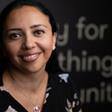Zoraida Colorado on how a telephone outreach service is leading to measurable improvements to cancer screening rates in London

Szanowna Pani x,
Zapraszamy Pania do wykonania badania przesiewowego jelit w dniu 26 listopada 2018 (sroda) o godzinie 09:10 w centrum Sir Ludwig Guttmann. NHS oferuje badanie przesiewowe majac na celu ochrone zycia przed rakiem jelita grubego. Ponadto powyzsze badanie pomaga we wczesnej diagnostyce raka jelita co pozwala na lepsza walke z choroba na wczesnym etapie rozwoju.
W razie pytan odnosnie badania przesiewowego prosimy o skontaktowanie sie z wydzialem przesiewowym. Jezeli potrzebuje Pani pomocy w podjeciu decyzji odnosnie badania prosimy skontaktowac sie z Pani lekarzem pierwszego kontaktu (GP).
To many people, the above will mean nothing. However, the over 546,000 people in England and Wales who speak Polish will know that this letter is inviting the recipient to a bowel cancer screening appointment.
Nearly 865,000 people in England and Wales either cannot speak English well or at all, and yet many of them are receiving letters like the one above, in a language they’re less familiar with, inviting them to take important action in support of their health.
It is no coincidence that London boroughs with higher levels of non-English speakers and a higher non-British population have lower cancer screening rates compared to the England average.
At Community Links, we understand that to engage with a community, you must be able to communicate effectively and build trust; we believe in Early Action (preventing problems from occurring rather than struggling with the consequences), forging deep value relationships and developing Ready for Everything Communities.
This attitude underscores the successes we’ve delivered with our cancer awareness and cancer screening telephone reminder programmes. We are currently delivering these programmes across 16 London boroughs and are looking to expand the model across the rest of England and Wales in due course.
More than one in three people will develop some form of cancer during their lifetime. Cancer screening programmes are designed to detect cancer early.
Encouraging participation
The earlier the condition is found, the better the chances of surviving it. With my team of multilingual health facilitators, I run a series of programmes that work with GP practices to contact patients who have failed to send back screening kits or respond to screening invitations and actively encourages participation, raises awareness of the signs and symptoms of cancer, and responds to any queries or concerns that the patient may have.
Our wonderful health facilitators are largely recruited from patients’ own local communities, reflect their local demographic and, speaking 26 different languages between them, can communicate crucial messages to patients effectively.
With the prime minister’s recent commitment to increase early diagnoses of cancers, this is a key moment to start ensuring that this type of work becomes core to our national screening programme in order to extend life, to address health inequalities and to reach out to our diverse local communities
Having received training from NHS staff, Cancer Research UK and our own highly experienced staff, our health facilitators have called over 130,000 patients over eight years, relating to the non-return of bowel screening kits and participation in the breast screening programme. More people attending screening appointments or returning screening kits means fewer late diagnoses and fewer deaths from cancer.
In 2017, in our home borough of Newham alone, 87 abnormalities were identified from patients’ screening kits as a result of our health facilitators’ interventions. That’s 9 per cent of those who returned their kits. Our breast cancer screening telephone support programme drove a 5-10 per cent increase in screening coverage.
In 2015-16, patients were at least two and a half times (2.66 times) more likely to attend screening when they were contacted by the telephone service. Without the telephone outreach service these patients are likely to have remained non-responders with an increased chance of being diagnosed with cancer late.
Even when patients receive a letter in a language they can understand, vulnerable individuals might still need help navigating a confusing and potentially distressing system.
Having somebody who a patient can relate to on the end of a phone, explaining that they can get the number 339 bus from the end of their road directly to the screening hub, can help to develop a deep value relationship between service user and service provider, which can make all the difference in the world.
By focusing our attention on the more hard-to-reach sections of our communities, we are delivering significant, measurable improvements to cancer screening rates in London. Our work in 16 London boroughs across the city regularly demonstrates that our model is effective.
My ambition is to provide our services in every London borough, helping to reduce the number of people who die from cancer every year and ultimately to develop our reach nationally without ever detaching ourselves from the communities we serve.
With the prime minister’s recent commitment to increase early diagnoses of cancers, this is a key moment to start ensuring that this type of work becomes core to our national screening programme in order to extend life, to address health inequalities and to reach out to our diverse local communities.




























No comments yet